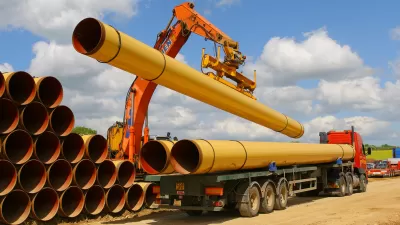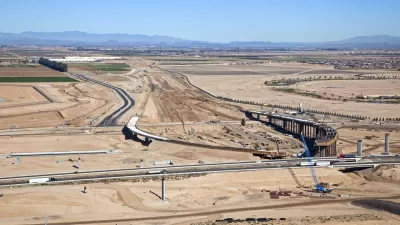Making materials like cement, plastic, glass, and steel creates a lot of emissions. In an opinion piece, Bill Gates argues any climate plan needs to grapple with these hard-to-decarbonize industries.

The American energy sector is increasingly moving away from coal and other big emitters, while transportation's emissions continue to grow. Many plans have been written about lowering emissions from coal and oil, but what about steel?
Microsoft Co-Founder Bill Gates argues that the difficulty of decarbonizing the manufacture of materials like steel will be a crucial issue to tackle to fight climate change. "Making steel and other materials—such as cement, plastic, glass, aluminum, and paper—is the third biggest contributor of greenhouse gases, behind agriculture and making electricity. It’s responsible for a fifth of all emissions,” Gates argues in his website Gates Notes.
While it may be possible to reduce our dependence on some materials, they are used for good reasons. "Steel—cheap, strong, and infinitely recyclable—also goes into shingles, household appliances, canned goods, and computers. Concrete—rust-resistant, rot-proof, and non-flammable—can be made dense enough to absorb radiation or light enough to float on water," Gates writes. Gates argues that many strategies will be needed to tackle the issue, including fuel switching (many of these industries use coal), electrification, and carbon capture.
FULL STORY: Here’s a question you should ask about every climate change plan

Alabama: Trump Terminates Settlements for Black Communities Harmed By Raw Sewage
Trump deemed the landmark civil rights agreement “illegal DEI and environmental justice policy.”

Planetizen Federal Action Tracker
A weekly monitor of how Trump’s orders and actions are impacting planners and planning in America.

The 120 Year Old Tiny Home Villages That Sheltered San Francisco’s Earthquake Refugees
More than a century ago, San Francisco mobilized to house thousands of residents displaced by the 1906 earthquake. Could their strategy offer a model for the present?

In Both Crashes and Crime, Public Transportation is Far Safer than Driving
Contrary to popular assumptions, public transportation has far lower crash and crime rates than automobile travel. For safer communities, improve and encourage transit travel.

Report: Zoning Reforms Should Complement Nashville’s Ambitious Transit Plan
Without reform, restrictive zoning codes will limit the impact of the city’s planned transit expansion and could exclude some of the residents who depend on transit the most.

Judge Orders Release of Frozen IRA, IIJA Funding
The decision is a victory for environmental groups who charged that freezing funds for critical infrastructure and disaster response programs caused “real and irreparable harm” to communities.
Urban Design for Planners 1: Software Tools
This six-course series explores essential urban design concepts using open source software and equips planners with the tools they need to participate fully in the urban design process.
Planning for Universal Design
Learn the tools for implementing Universal Design in planning regulations.
Clanton & Associates, Inc.
Jessamine County Fiscal Court
Institute for Housing and Urban Development Studies (IHS)
City of Grandview
Harvard GSD Executive Education
Toledo-Lucas County Plan Commissions
Salt Lake City
NYU Wagner Graduate School of Public Service





























